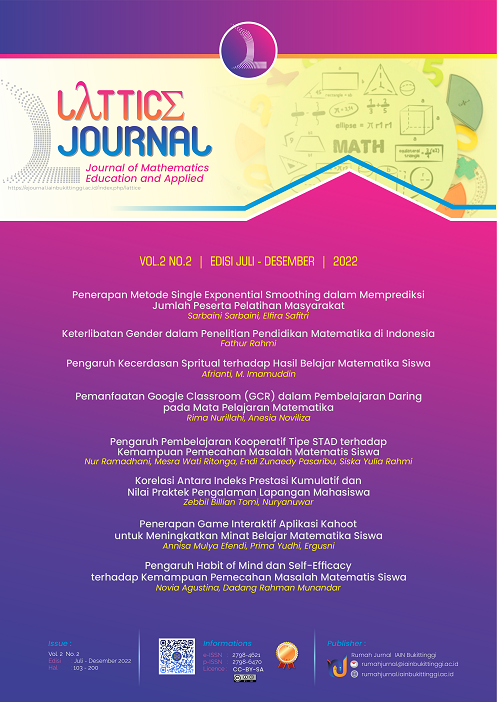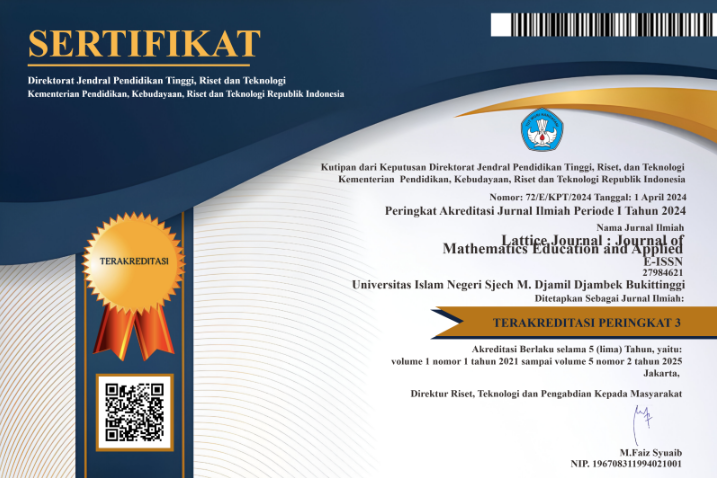Pengaruh Pembelajaran Kooperatif Tipe STAD terhadap Kemampuan Pemecahan Masalah Matematis Siswa
DOI:
https://doi.org/10.30983/lattice.v2i2.6014Keywords:
Pembelajaran Kooperatif, STAD, Kemampuan Pemecahan Masalah MatematisAbstract
The ability to solve mathematical problems is one of the competencies that must be mastered by students so that learning objectives are achieved properly. Therefore, an appropriate method is needed in learning mathematics at school. The purpose of this study was to determine whether there was an influence of Type STAD Cooperative Learning on the mathematical problem solving abilities of class X students of SMKS Siti Banun TA. 2020-2021. This type of research is quantitative with quasi-experimental methods. The sampling technique in this study was saturated sampling consisting of two classes with each class consisting of 38 students. The instrument used in this study was a test of mathematical problem solving abilities in the form of a description. The research hypothesis was analyzed using the t-test. Based on the results of the analysis, it was concluded that there was an influence of Type-STAD cooperative learning on the mathematical problem solving abilities of class X students of SMK Siti Banun TA. 2020-2021. This is evidenced by the results of the analysis with the help of the SPSS program which shows a significance number of 0,00 < 0,05.
Kemampuan pemecahan masalah matematis merupakan salah satu kompetensi yang wajib dikuasai oleh siswa agar tujuan pembelajaran tercapai dengan baik. Oleh karena itu, diperlukan metode yang tepat dalam pembelajaran matematika di sekolah. Tujuan penelitian ini adalah untuk mengetahui ada tidaknya pengaruh Pembelajaran Kooperatif Tipe STAD terhadap kemampuan pemecahan masalah matematis siswa kelas X SMKS Siti Banun TA. 2020-2021. Jenis penelitian ini adalah kuantitatif dengan metode kuasi eksperimen. Teknik pengambilan sampel dalam penelitian ini yaitu sampling jenuh yang terdiri dari dua kelas dengan masing-masing kelas terdiri dari 38 siswa. Instrumen yang digunakan dalam penelitian ini berupa soal tes kemampuan pemecahan masalah matematis berbentuk uraian. Hiptesis penelitian dianalisis menggunakan uji-t. Berdasarkan hasil analisis, diperoleh simpulan bahwa terdapat pengaruh pembelajaran kooperatif Tipe-STAD terhadap kemampuan pemecahan masalah matematis siswa  kelas X SMK Siti Banun TA. 2020-2021. Hal ini dibuktikan dari hasil analisis dengan bantuan program SPSS yang menunjukkan angka signifikansi 0,00 < 0,05..
References
Janner Simarmata et al., Teori Belajar dan Pembelajaran. Medan: Yayasan Kita Menulis, 2021.
N. Sudjana, Cara Belajar Siswa Aktif dalam Proses Belajar Mengajar. Bandung: Sinar Baru Algensindo, 2010.
M. Ibrahim, F. Rachmadiarti, M. Nur, and Ismono, Pembelajaran Kooperatif. Surabaya: UNESA-University Press, 2020.
U. Sumarmo, “Pembelajaran Matematika untuk Mendukung Pelaksanaan Kurikulum Tahun 2002 Sekolah Menengah,†Gorontalo, 2005.
H. dan U. S. Hendriana, Penilaian Pembelajaran Matematika. Bandung: PT Refika Aditama, 2016.
A. Taufik and I. Arsid, “Kemampuan Pemecahan Masalah Matematis Siswa dalam Menyelesaikan Soal HOTS,†Histogram J. Pendidik. Mat., vol. 4, no. 2, pp. 581–589, 2020.
L. I. Komalasari, “Analisis Kemampuan Siswa dan Guru dalam Menyelesaikan Masalah Matematika,†Histogram J. Pendidik. Mat., vol. 3, no. 2, pp. 189–198, 2019.
S. H. Hutasuhud, “Perbedaan Kemampuan Pemecahan Masalah Matematis Siswa antara Model Pembelajaran Kooperatif Tipe STAD, TPS, dan TAI di SMP Negeri 1 Labuhan Deli,†UNIMED, 2018.
S. Nasution, Didaktik Asas-asas Mengajar. Jakarta: Bumi Aksara, 2000.
R. A. Sani, Strategi Belajar Mengajar. Jakarta: Rajawali Press, 2019.
H. Karli and M. S. Yuliariatiningsih, Implementasi kurikulum berbasis kompetensi : model-model pembelajaran. Bandung: Bina Media Informasi, 2004.
H. S. Tanjung, “Komunikasi Matematik Siswa Sekolah Menengah Atas (SMA) melalui Model Pembelajaran Kooperatif,†Mat. J., vol. 3, no. 2, pp. 59–68, 2016.
E. Suherman, Turmudi, Herman, Suhendra, Nurjanah, and Rohayati, Strategi Pembelajaran Matematika Kontemporer. Bandung: UPI Press, 2003.
Tuah and S. Y. Rahmi, “Pengaruh Pembelajaran Kooperatif Tipe Student Team Achievement Divisions terhadap Higher Order Thinking Skills Siswa,†Al-Khawarizmi J. Pendidik. Mat., vol. 1, no. 2, 2020.
S. Arikunto, Prosedur Penelitian Suatu Pendekatan Praktek. Jakarta: Rineka Cipta, 2014.
Hartono, Analisis Item Instrumen. Pekanbaru: Zanafa Publishing, 2015.
Z. Arifin, Evaluasi Pembelajaran, Kedelapan. Bandung: PT. Remaja Rosdakarya, 2016.
E. Suherman, Evaluasi Pengajaran Matematika. Bandung: UPI Press, 2003.
E. Z. Pasaribu et al., Belajar Statistika: Siapa Takut dengan SPSS. 2020.
L. Oakley, Cognitive Development. London: Routledge, 2004.
Z. Abidin, “Pengaruh Model Pembelajaran Tutor Sebaya terhadap Hasil Belajar Matematika,†Panthera J. Ilm. Pendidik. Sains dan Terap., vol. 1, no. 1, pp. 19–24, 2021.
E. T. Ruseffendi, Pengantar kepada Membantu Guru Mengembangkan Kompetensinya dalam Pengajaran Matematika untuk Meningkatkan CBSA. Bandung: Tarsito, 1991.
Downloads
Published
How to Cite
Issue
Section
Citation Check
License
Copyright (c) 2022 Nur Ramadhani, Mesra Wati Ritonga, Endi Zunaedy Pasaribu, Siska Yulia Rahmi

This work is licensed under a Creative Commons Attribution-ShareAlike 4.0 International License.
Authors who publish with Lattice Journal : Journal of Mathematics Education and Applied agree to the following terms: Authors retain copyright and grant the Lattice Journal : Journal of Mathematics Education and Applied right of first publication with the work simultaneously licensed under a Creative Commons Attribution License (CC BY-SA 4.0) that allows others to share (copy and redistribute the material in any medium or format) and adapt (remix, transform, and build upon the material) the work for any purpose, even commercially with an acknowledgement of the work's authorship and initial publication in Lattice Journal : Journal of Mathematics Education and Applied. Authors are able to enter into separate, additional contractual arrangements for the non-exclusive distribution of the journal's published version of the work (e.g., post it to an institutional repository or publish it in a book), with an acknowledgement of its initial publication in Lattice Journal : Journal of Mathematics Education and Applied. Authors are permitted and encouraged to post their work online (e.g., in institutional repositories or on their website) prior to and during the submission process, as it can lead to productive exchanges, as well as earlier and greater citation of published work (See The Effect of Open Access).



